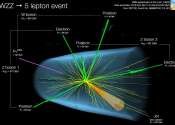ATLAS searches for pairs of Higgs bosons in a rare particle decay
Since the Higgs boson was discovered in 2012, scientists at the Large Hadron Collider (LHC) have been studying the properties of this very special particle and its relation to the fundamental mechanism essential to the generation ...









